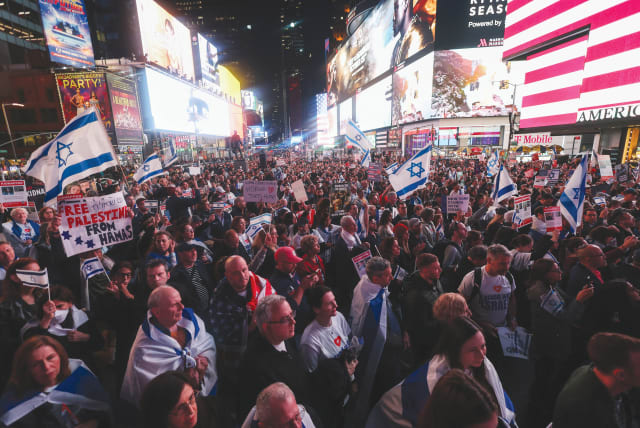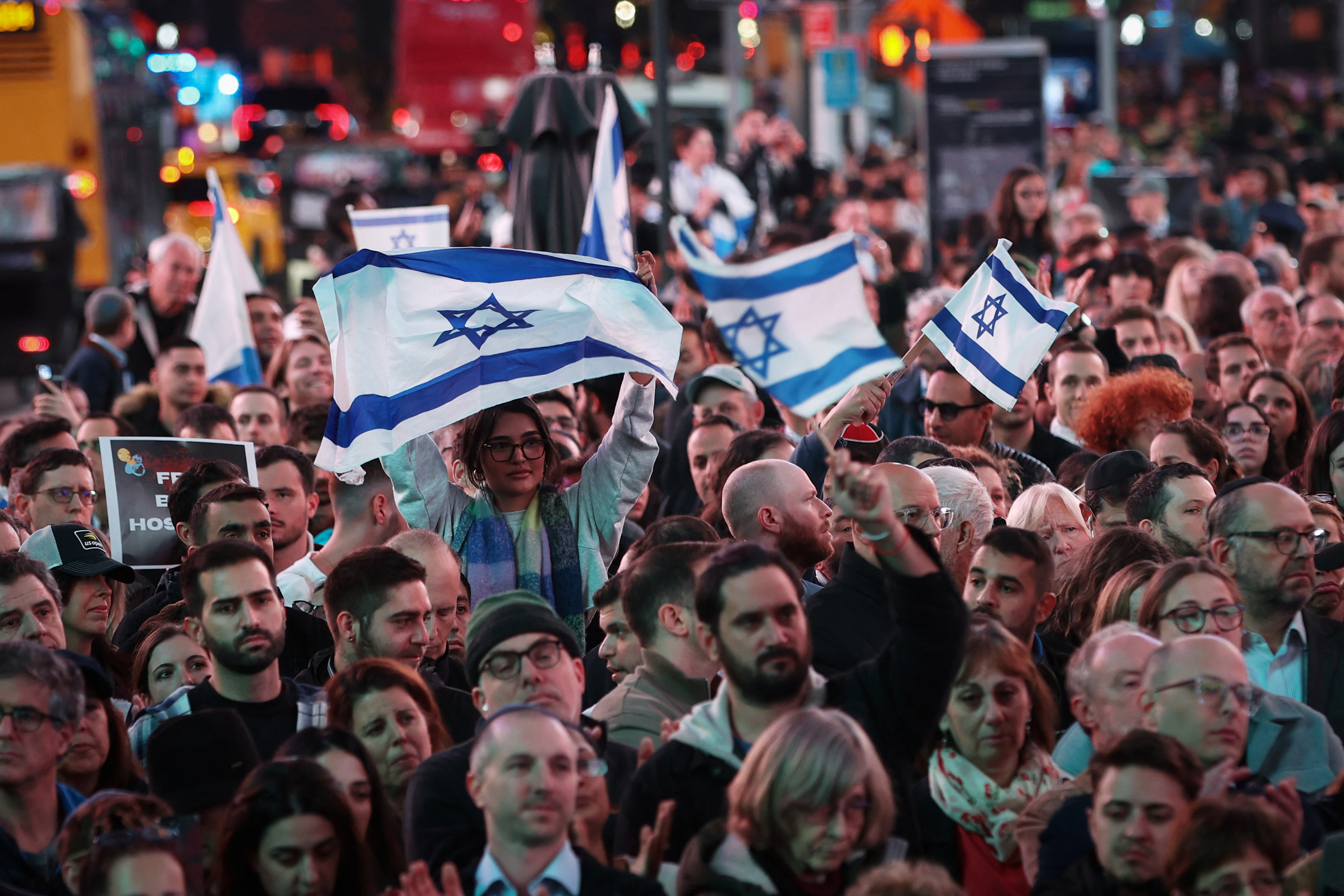American Jewry: Time for mass rally in DC - opinion

MIDDLE ISRAEL: The Diaspora’s role this time around should be about more than just solidarity.
Having endured 13 suicide bombings in the previous 10 weeks alone, Israelis didn’t need the rest of 2002’s 47 suicide attacks to understand that the enemy was deploying a new strategic weapon.
Eager to make the Diaspora do something about our predicament, this column called on American Jews to do what they had not done for decades and take to the streets (“To the Diaspora,” March 15, 2002). One month and 11 suicide attacks later, 100,000 people descended on Capitol Hill (“Thousands hold rally in capital to back Israel,” The New York Times, April 16, 2002).
The aggregate death toll in those 24 suicide attacks (excluding the terrorists) was 106. This month’s Black Sabbath massacre saw at least 1,000 Israeli civilians murdered, in addition to some 300 soldiers. This magnitude alone, not to mention the murderers’ barbaric methods and antisemitic ideology, means that what just happened demands that the Diaspora rally again.
Traumatic memories in our DNA
However, the Diaspora’s role this time around should be about more than just solidarity. The worst anti-Jewish atrocity since the Holocaust has provoked traumatic memories etched in every Jew’s DNA, and should therefore be seen, and treated, as an attack on each of the world’s 15 million Jews.
Moreover, parallel to the military war it is fighting, Israel also faces a moral war, and that war is waged in the lands of the Diaspora. Not only is this part of the war happening abroad geographically, but mentally it targets, and indeed threatens, every single Jew.
A particularly chilling epitome of this reality emerged two days after the massacre. Outside the Sydney Opera House, a mob shouted “Gas the Jews.” That disgrace may have been an exception, but the principle remains that the moral war on Israel involves every Jew. That is why the counteroffensive on this front should be led by world Jewry, in three ways: rally, picket, expose.
Quiet lobbying over public demonstrations
DIASPORA LEADERS traditionally preferred quiet lobbying over public demonstrations. This is what guided the tragically feeble response of American Jewry’s leaders as news of the Holocaust began trickling out.
The taboo had actually been broken decades earlier, in 1905, when 125,000 Jews marched from Manhattan’s Lower East Side to Union Square in protest of the pogroms in czarist Russia. It was one of the largest rallies New York had seen and a show of force American Jewry had never displayed.
Even so, during the Holocaust American Jewry failed to take to the streets, other than the anecdotal march on October 6, 1943, of 500 rabbis down Washington’s Pennsylvania Avenue demanding American action. The march was “colorful,” noted American Jewry’s historian Jonathan Sarna, but it was the only one of its kind in Washington, and it, too, received but “scant national attention” (American Judaism, 2004, p. 264).
The postwar sense of guilt changed all that as the struggle for Soviet Jewry’s liberation proved, most memorably on December 6, 1987, when American Jewry gathered at the National Mall 250,000 Jews and non-Jews – including Peter, Paul, and Mary, and then-vice president George H.W. Bush – demanding that the USSR free its Jews.
Such a rally is the first thing American Jewry must do in the aftermath of the Black Sabbath massacre. Titled “Israel Is Me,” the rally will imply that attacking Israel means messing with the world’s 15 million Jews and with their even more numerous non-Jewish friends.
The rally in Washington should be addressed by senators, governors, mayors, clergy, literati, and movie stars. Smaller events should be held in other major cities around the world. Billboard ads along highways, zeppelins in the skies, T-shirts in bazaars, pins on suits, and buttons on collars will all state what will become a global rallying cry: Israel is me.That’s what should happen on the streets. A parallel struggle will veer to the diplomatic arena.THE DIASPORA’S diplomatic arrows should be aimed at one target: Iran.
Whatever technical role it played in the Black Sabbath massacre, Iran inspired it. Tehran plays the role the Kremlin played last century, when it inspired the global war on freedom. Back then, Jews throughout the world regularly picketed Soviet embassies and held vigils outside Soviet consulates demanding that the Soviet Union subscribe to basic civilizational norms.
Cynics scorned those efforts as ineffective and naive, but their end result was that the Jews went free and the Soviet Union died. If this attitude is now implemented toward Iranian embassies, it will be an important contribution to what should become a civilizational struggle against the world’s most intolerant, subversive, and violent regime.
The targets of this struggle are awaiting the Diaspora’s action. The places to start would be the Iranian mission to the UN (622 Third Ave., New York) and the embassies in London (16 Price’s Gate overlooking Hyde Park) and Paris (4 Ave. D’Iéna).
Chanting “Israel is me” in the ears of Iran’s diplomats would send the message to the world that what Israel faces is not a liberation movement but the Islamist scourge.
Lastly, the Diaspora should wage a personal war on whomever it detects as an accomplice in the moral war on Israel. This would include handpicked representatives of the scholars, celebrities, and campus activists who condoned the Black Sabbath massacre.
These people would be outed, and their careers damaged. You, they will be told, joined the enemies of civilization.
Whether out of hatred or ignorance, malice or gullibility, frivolity or gain, you have joined the infamous list of the Jewish people’s libelers, from the medieval church through czarist Russia to Nazi Germany. The Jews outlasted them all and will outlast you, too. Yes, you claim your war is not on the Jews, only on Israel, but I, the eternal Jew, don’t believe you. I don’t believe you because Israel is me.
The writer, a Hartman Institute fellow, is the author of the bestselling Mitzad Ha’ivelet Ha’yehudi (The Jewish March of Folly, Yediot Sefarim, 2019), a revisionist history of the Jewish people’s political leadership.
Jerusalem Post Store
`; document.getElementById("linkPremium").innerHTML = cont; var divWithLink = document.getElementById("premium-link"); if (divWithLink !== null && divWithLink !== 'undefined') { divWithLink.style.border = "solid 1px #cb0f3e"; divWithLink.style.textAlign = "center"; divWithLink.style.marginBottom = "15px"; divWithLink.style.marginTop = "15px"; divWithLink.style.width = "100%"; divWithLink.style.backgroundColor = "#122952"; divWithLink.style.color = "#ffffff"; divWithLink.style.lineHeight = "1.5"; } } (function (v, i) { });

